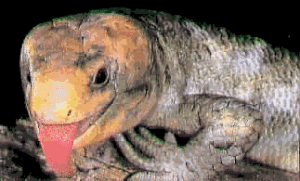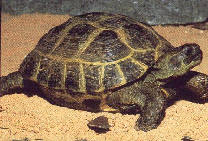Acrylic Shell Repair for an Injured Tortoise
Understanding the Avian Post-purchase Exam
Feline Upper Respiratory Infections & Bordetella Vaccinations
Prehensile-tailed Skink (Corucia zebrata)
The Ball Python (Python regius)
The Leopard Tortoise (Geochelone pardalis)
The Russian Tortoise (Testudo horsfieldi)
 Prehensile SkinkThe Prehensile-tailed Skink (a.k.a. Monkey-tailed Skink, Solomon Island Skink, and Zebra Skink) is one of the larger skink species. In the wild, C. zebrata are found inhabiting the Solomon Islands and Papua New Guinea of the South Pacific. Crepuscular and nocturnal in nature (active around the dusk to dawn hours), C. zebrata can be found primarily in
Prehensile SkinkThe Prehensile-tailed Skink (a.k.a. Monkey-tailed Skink, Solomon Island Skink, and Zebra Skink) is one of the larger skink species. In the wild, C. zebrata are found inhabiting the Solomon Islands and Papua New Guinea of the South Pacific. Crepuscular and nocturnal in nature (active around the dusk to dawn hours), C. zebrata can be found primarily in  Russian TortoiseThe Russian Tortoise (a.k.a. Steppe, Afghan, or Horsfeld’s Tortoise) is a recent introduction to the pet trade of the Western World. Little is known about its natural habits, and consequently our understanding of its proper care in captivity is continually improving. Presently, two subspecies have been proposed; T. horsfieldi kazachtanica with a range from
Russian TortoiseThe Russian Tortoise (a.k.a. Steppe, Afghan, or Horsfeld’s Tortoise) is a recent introduction to the pet trade of the Western World. Little is known about its natural habits, and consequently our understanding of its proper care in captivity is continually improving. Presently, two subspecies have been proposed; T. horsfieldi kazachtanica with a range from